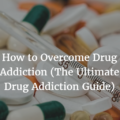When you feel or get to know that any of your loves is not well. You want to do everything and anything to make them feel better. Whether it is any physical health issues or emotional health issues, we always want to stay side by side with our close ones.
What if the problem your closest friend or family member is experiencing is addiction?
What will you do then?
When it comes to addiction, most of us do not have a proper idea about it, especially about the symptoms and treatment. Addiction treatment includes both detox and safe withdrawal. At the very first, you have to have a basic understanding of addiction.
What Is An Addiction?
As per the ASAM or the American Society of Addiction Medicine, addiction is a chronic disease, which affects the reward system of the brain, along with memory functions and motivation. An individual with addiction will always crave some behavioral habits or a substance.
In order to support and fulfill their desires, those individuals will often ignore or avoid other life areas and responsibilities. Here are some general signs of addiction.
- Physical signs, for example, needing high dodge for effect or withdrawal symptoms.
- Ignoring or avoiding risk factors, such as sharing needles, knowing the consequences of that.
- Reduced socialization, such as ignoring relationships or abandoning commitments.
- Lack of control, along with the inability to keep oneself away from a behavior or substance.
Different Types Of Addiction
In most cases, addiction is mostly associated with some sort of substance abuse. However, we can not simply ignore behavioral addiction, such as gambling is one of the serious ones.
As per ASAM, addiction is more like a disease when an individual becomes unable to refrain consistently from a substance or behavior. It typically takes tools on their physical and mental health.
When it comes to substance addiction, the following are the reasons.
- Medication.
- Drugs, non-illicit or illicit.
- Alcohol.
- Tobacco, or nicotine.
- Inhalants, mostly household items, such as spray paints, oven cleaners, and some other aerosol substances.
Studies also state that behavioral addictions are as severe and chronic as substance abuse. Whether it is substance abuse or behavioral addiction, both cause dependency and come with almost similar or the same negative consequences.
Here are some of the behavioral addictions.
- Using the media or the internet.
- Video games.
- Shopping.
- Sex.
- Working.
- Gambling.
It does not matter what type of addiction your family member or friend is suffering from; all the types of addiction come with some negative consequences. Therefore, you have to opt for treatment for the addiction as soon as possible.
Spot Addiction Problems In Your Friend Or Family Member
Now, as you get some basic idea about addiction, it is time to check for the symptoms in your loved one. In the early stages or initial days, the individual may not show telltale signs of a full-blown addiction. Here are some of the early signs.
- Family history of addiction.
- Experimentation.
- Episodes of loss of control or binging with a little to almost no feelings of remorse after.
- Seeking out particular situations where the activity or substance is present.
- Being specifically drawn to a substance or activity.
At the same time, if it comes to common social behaviors like smoking or drinking, in that case, it becomes really difficult to identify the addiction. Often, what looks like addiction is nothing but just an experimental phase or a specific form of managing extra stress.
Physical Symptoms
When you are thinking about how to recognize addiction in your friend or family member, you should look for some changes in physical health and also mental health. Whether it is a behavioral or substance addiction, the health of the individual will always decline.
Here are the health changes you should look for.
- Constant illness.
- Glazed or bloodshot eyes.
- An abrupt change in weight.
- Unexplained injuries.
- Increased drug tolerance.
- Problem with recall or memory loss.
- Physical withdrawal symptoms, such as vomiting, trembling, or sweating.
- Changes in speech, for example, rapid rambling or slurred words.
- Bad nails, teeth, hair, skin.
Here are some more health issues the person will suffer from.
- Dilated pupils.
- Track marks or marks of injections.
- Blood in vomit.
- A husky voice.
- Flushed skin.
- Nausea.
- Insomnia.
- Headaches.
- Broken capillaries on the face.
- Severe gastrointestinal distress.
Mental Symptoms
Apart from all the physical signs, you also should look for mental signs as well. Here are some of the mental health changes you should look for in your friend and family member.
- Suicidal thoughts.
- Apathy.
- Depression.
- Irritability.
- Aggressive behavior.
- Sudden changes in mood.
You always should keep in mind that it is really important to eliminate all the potential threats at the very beginning when you get to know or understand that the individual’s health is declining.
You have to understand the seriousness of their condition who are struggling with any type of addiction. That is why it is always advised to consult with a professional addiction treatment expert and opt for a rehabilitation or detox center.
Changes In Personality
After the individual shifts experimenting or the initial phase of addiction, the person will start to show some major behavioral or personality changes. Here are the symptoms or signs you should look for.
- More secrecy, such as lying about the amount of time spent or substance use.
- A significant change in sleeping patterns, which also results in chronic fatigue.
- Ignoring, or avoiding the consequences of their actions.
- Some risk-taking tendencies, particularly to continue certain behaviors and get drugs.
- Missing crucial obligations, like studies and work.
- Reacting negatively to the closest individual or neglecting relationships.
- Lacking interest in activities that the individual used to like or their hobbies.
People with addiction mostly surround themselves with similar individuals who are also into addiction.
Step Forward To Help Them
After identifying that any of your friends or family members are suffering from any type of addiction, your job or duty is not done. It is just the beginning of your responsibility. Once you get to understand the type of addiction the individual is suffering from, you should go for proper treatment in a rehabilitation or detoxification center.





